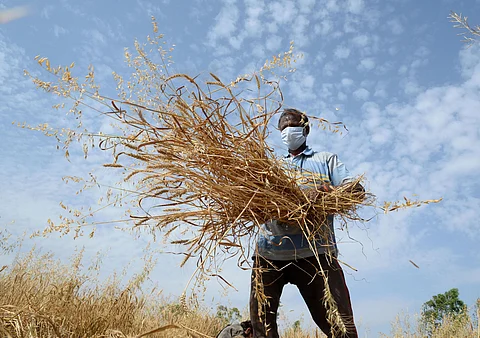

The most durable myth of India’s political economy is one perpetuated by its politicians — that the farmers need their protection. The fact that nearly two-thirds want to quit farming and that half the populace must subsist on barely 15 percent of national income eloquently illustrates the reality.
In his soul stirring book What Then Must We Do?, Leo Tolstoy writing about the oppression of the Tula peasantry observed, “I sit on a man’s back; choking him and making him carry me, and yet assure myself and others that I am very sorry for him and wish to ease his lot by all possible means — except by getting off his back.” India’s political class has consistently promised to ease the lot of farmers by all means except by getting off their back.
The Indian farmer is not hankering for charity. The farmer wants to leverage land, labour and capital like any other entrepreneur but alas cannot. The farmer is promised credit but denied access to it. The rhetoric of free power supply translates into unreliability. Pricing is subject to populist whims. Access to markets is controlled by politically blessed cartels. India’s largest private sector, wracked by debt and destitution, is reduced into a case for political charity.
The parade of populist pretence persists. This week, the farmer emerged as the collateral cause in the quest of power once again. The cause was legislation of laws which afford farmers access to open markets — the dismantling of the stranglehold of Agricultural Produce Market Committees (APMCs), enabling of contracts with private buyers and easing of limits on stocks of essential commodities.
Predictably, the first protests emerged in Punjab triggering the resignation of Akali Dal leader Harsimrat Kaur Badal from the Union Cabinet. Soon an allusion, the scrapping of minimum support price, turned into a political declaration. As protests spilled out, Prime Minister Narendra Modi tweeted, “I assure my farmer brothers and sisters that the system of MSP and government procurement will remain.”
That didn’t detain the opposition from launching theories and protests. Rahul Gandhi alleged it was a corporate conspiracy. Mayawati dubbed the bills anti-farmer and pro-rich. Mamata Banerjee’s Trinamool Congress said the bills were draconian. Fact is the reforms have been on the national agenda since 1999 — and an aspiration of successive regimes. A model APMC and contract law was shared with states as early as in 2003. In 2007 under the Congress-led UPA, model rules were released and the Congress shifted vegetables and fruits out of APMCs in 2013. Indeed, the 2019 Congress Manifesto expressly states, “Congress will repeal the Agricultural Produce Market Committees Act and make trade in agricultural produce—including exports and inter-state trade—free from all restrictions.”
Typically in politics where a party stands on issues depends on where it sits. Objective analysis demands allegiance to facts. Have APMCs served the farmers’ cause? In January 2019, the parliamentary standing committee on agriculture — including MPs from Congress and Akali Dal — observed APMCs have “become hotbed of politics, corruption and monopoly of traders and middleman” and “are not working in interest of farmers”.
Consider the logistics. India’s agri-sector spread across lakhs of villages is served by just 2,477 APMCs and 4,843 sub-markets. As for government procurement, only a third of the wheat and rice output is bought by government — bulk of the wheat from five states and rice from seven states — and the rest is bought by private yards. In fact, 22 states already allow direct procurement by private parties — and there are no APMCs in Bihar, Kerala, and Sikkim. Frequently, the MSP functions as the cap not the floor for farmer remuneration with farmers selling for less than MSP.
Fear though has neither a bottom nor a cap. Sukhbir Singh Badal’s deftly deployed it in his tweet using hashtags: “Small farmers fear that these #Ordinances will be like the #Jio initiative. They think this Act will create monopoly of multinational companies, which will exploit them.”Arguably, there are flaws in the legislation — on definitions of trader, traded area, dispute resolution and most importantly sustenance of credible choice for farmers to sell their produce to. Credibility of intent calls for addressing fears — India’s regulatory landscape is notoriously lazy in curbing monopolies and big players could unleash predatory practices. That though doesn’t mean the crop must be destroyed with the weeds.
India is one of the largest producers of food grains, fruits, vegetables, milk and animal produce. Studies show over Rs 92,000 crore worth of produce is wasted — NSSO 70th round shows 34 per cent of fruits and 44 per cent of vegetables perish between farm gate and market gate. Barely 10 per cent of total food produced in India is converted into value added products. Fragmented holdings deter economies of scale and thus better yields. Transformation needs structural reforms for empowerment. A product manufacturer can enter into a contract with a buyer, seek an advance, source credit using the order, access know-how, insurer output and sell his produce anywhere. The farmer deserves the same freedom — and liberation from political licence raj.
SHANKKAR AIYAR is the author of The Gated Republic, Aadhaar: A Biometric History of India’s 12 Digit Revolution, and Accidental India. He can be reached at shankkar.aiyar@gmail.com.